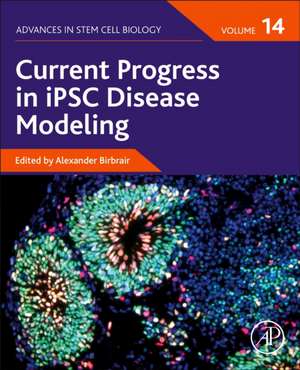Current Progress in iPSC Disease Modeling: Advances in Stem Cell Biology
Editat de Alexander Birbrairen Limba Engleză Paperback – 16 noi 2021
It is written for researchers and scientists in stem cell therapy, cell biology, regenerative medicine and organ transplantation, and is contributed by world-renowned authors in the field.
- Provides an overview of the fast-moving field of stem cell biology and function, regenerative medicine and therapeutics
- Covers advances in research on how induced pluripotent stem cells are used to create new tissues/organs
- Contributed by world-renowned experts in the field
Din seria Advances in Stem Cell Biology
- 28%
 Preț: 797.64 lei
Preț: 797.64 lei - 27%
 Preț: 782.05 lei
Preț: 782.05 lei - 23%
 Preț: 796.11 lei
Preț: 796.11 lei - 24%
 Preț: 785.01 lei
Preț: 785.01 lei - 24%
 Preț: 786.68 lei
Preț: 786.68 lei - 22%
 Preț: 801.17 lei
Preț: 801.17 lei - 22%
 Preț: 798.16 lei
Preț: 798.16 lei - 22%
 Preț: 798.68 lei
Preț: 798.68 lei - 9%
 Preț: 800.27 lei
Preț: 800.27 lei - 23%
 Preț: 797.52 lei
Preț: 797.52 lei - 22%
 Preț: 798.16 lei
Preț: 798.16 lei - 23%
 Preț: 801.44 lei
Preț: 801.44 lei - 23%
 Preț: 796.37 lei
Preț: 796.37 lei - 22%
 Preț: 798.02 lei
Preț: 798.02 lei - 22%
 Preț: 801.55 lei
Preț: 801.55 lei - 9%
 Preț: 801.36 lei
Preț: 801.36 lei
Preț: 797.78 lei
Preț vechi: 876.68 lei
-9% Nou
Puncte Express: 1197
Preț estimativ în valută:
152.66€ • 157.73$ • 126.99£
152.66€ • 157.73$ • 126.99£
Carte tipărită la comandă
Livrare economică 13-27 martie
Preluare comenzi: 021 569.72.76
Specificații
ISBN-13: 9780323857659
ISBN-10: 0323857655
Pagini: 324
Ilustrații: 60 illustrations (40 in full color)
Dimensiuni: 191 x 235 mm
Editura: ELSEVIER SCIENCE
Seria Advances in Stem Cell Biology
ISBN-10: 0323857655
Pagini: 324
Ilustrații: 60 illustrations (40 in full color)
Dimensiuni: 191 x 235 mm
Editura: ELSEVIER SCIENCE
Seria Advances in Stem Cell Biology
Cuprins
1. Human Induced Pluripotent Stem Cell Modeling of Neurofibromatosis Type 1
2. Use of Inducible Pluripotent Stem Cells (iPSCs) to Model inflammatory Neurodegeneration and Repair in Multiple Sclerosis
3. iPSCs for Modeling Chronic Mountain Sickness
4. iPSCs for Modeling Noonan Syndrome, Noonan Syndrome with Multiple Lentigines, and Costello Syndrome
5. Modeling Mitochondrial Encephalopathy Due to Melas/Leigh Overlap Syndrome Using Induced Pluripotent Stem Cells
6. How iPSCs Changed the Research Status of Polycystic Ovary Syndrome
7. Modeling Inherited Retinal Dystrophies using Induced Pluripotent Stem Cells
8. Modeling Hereditary Spastic Paraplegias using Induced Pluripotent Stem Cells
9. Smith-Magenis Syndrome: From genetics to clinical presentation, disease pathogenesis and model systems
10. iPSCs for Modeling of Cardiac Arrhythmias
11. Modelling heritable kidney disease using human iPSC-derived kidney organoids
2. Use of Inducible Pluripotent Stem Cells (iPSCs) to Model inflammatory Neurodegeneration and Repair in Multiple Sclerosis
3. iPSCs for Modeling Chronic Mountain Sickness
4. iPSCs for Modeling Noonan Syndrome, Noonan Syndrome with Multiple Lentigines, and Costello Syndrome
5. Modeling Mitochondrial Encephalopathy Due to Melas/Leigh Overlap Syndrome Using Induced Pluripotent Stem Cells
6. How iPSCs Changed the Research Status of Polycystic Ovary Syndrome
7. Modeling Inherited Retinal Dystrophies using Induced Pluripotent Stem Cells
8. Modeling Hereditary Spastic Paraplegias using Induced Pluripotent Stem Cells
9. Smith-Magenis Syndrome: From genetics to clinical presentation, disease pathogenesis and model systems
10. iPSCs for Modeling of Cardiac Arrhythmias
11. Modelling heritable kidney disease using human iPSC-derived kidney organoids
